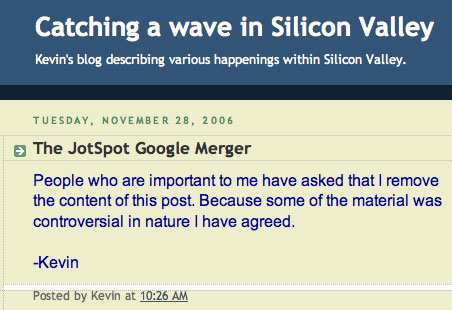Update (Dec. 1): “Kevin” is Kevin Hague, the co-founder of Knowesys. CEO Kathleen Romano ends the conspiracy theories in a comment here.
Update (Nov 30): JotSpot Founder Joe Kraus reponds in the comments.
Sometimes it isn’t until a blog post gets deleted for one reason or another that it grabs people’s attention. That happened today when a relatively new blogger named “Kevin” deleted a blog post titled “The JotSpot Google Merger,” where he complained that JotSpot left them stranded as a partner after Google acquired the company last month.
Blog posts are cached upon posting by a number of search engines, so the text of the original post is easily recovered:
The JotSpot Google Merger
So I’m finally at a point where I need to blog about the JotSpot (http://www.jotspot.com/) merger and how it was handled. The company I work for builds custom JotSpot Wiki’s for enterprise class companies and “was” JotSpot’s first Partner. We were JotSpot’s only Gold Partner and were evangelist of the technology during the last two years. We made a massive investment in JotSpot, learning new API’s, developing Wiki converters and custom applications for use with JotSpot.
To preface what I’m about to say, I am very happy to have worked with the JotSpot people, I learned a lot about new technologies from AJAX, XML, JSON and Wiki technology in general. I congratulate everyone at JotSpot and wish them good luck at Google.
Unfortunately, my company was one of the few (many?) who had a negative impact from the merger. Besides us, it is the other JotSpot Partners and customers who are now “left holding the bag”. What is truly interesting from our perspective is that no one at Google cares about the people who helped build the JotSpot product. Or if they do, it is through the rose colored glasses of lots of money. I guess that cures everything.
Here is what I’ve learned from this experience:
1. If you sign a partnership agreement, get some kind of notification clause that gives at least thirty days (preferably more) notice before any party terminates the agreement. We were notified of the merger on the same day it was announced and had to play fire control with our customers.
2. Look for signs of impending trouble. Before the announcement, we noticed everyone at Jot acting strange. Upgrades were being posted quickly and these changes were causing problems with nearly everyone’s code. Little or no communication occurred prior to the upgrades. Why would a company do things to hurt its customer base? Well, I guess the answer is that Google was the biggest customer and probably demanded the changes prior to purchase.
3. Pick your hosted application service provider well. Relying on web hosted application services is much more dangerous than I ever would have assumed. This is especially true for those services that are “closed source” like those of JotSpot. If an agreement is made with an application vendor like JotSpot, get some kind of service agreement that extends beyond merger/buyout. These type of agreements are a bit shaky but if the management team is any good, they’ll include them in the buyout agreement.
4. Part of the buyout agreement should include clauses specifying a roadmap. Taking an entire company “Dark” after a merger does nothing but cause problems for customers. In the JotSpot case, no one knows what Google is planning to do with JotSpot technologies. Will customer applications
continue to work?My question to Google (and the JotSpot people) is how can you treat your customers, some of which have been there from the beginning so poorly? Does the Google mantra “do no evil” apply only when convenient? I’m wondering if the lack of customer focus will yet again provide us with another wonderful exploding “Tech Bubble” here in the valley. Just my two cents….
There was some discussion on TechMeme of the original post, but nothing significant. The interesting issue isn’t that JotSpot had an angry customer, but rather who put pressure on this blogger to pull his post and replace it with:

Sure the post was controversial, but unless it was fabricated it gave the world good information on how JotSpot treated its customers as the company was acquired. What I want to know is, what company does Kevin work for, and who pressured him to delete the post?